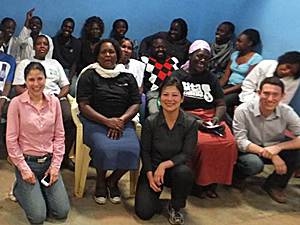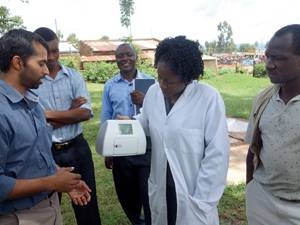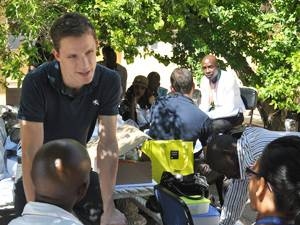Every student in the MIT Leaders for Global Operations program travels for internships and plant treks, but not many wind up working in Africa. Unless they're part of Global Health Delivery Lab (ghdLab), a hands-on MIT Sloan course that sends teams of multidisciplinary graduate students to deliver health care to resource-limited areas in sub-Saharan Africa and South Asia.
Erna Pardede LGO '13 and her MIT Sloan MBA teammates studied ways to improve operational efficiency at the Shining Hope for Communities (SHOFCO) clinic in Kibera, one of the largest slums in Nairobi, Kenya. Their on-site work over spring break included a flow time study for 48 patients, interviewing staff and patients, visits to other clinics at Kibera, simulating patient experiences for a day and studying costs associated with the clinic. Their results: a set of recommendations including a new clinic floor layout to improve safety and minimize congestion, and a business strategy toolkit to evaluate growth.
"It was exciting to actually apply the skill sets I learned during my two years at LGO during the two weeks we were on the ground," Pardede says. "Basic operations management is key in assessing the clinic's operational health, and we were happy to know that our clients are really interested in what we're doing."
The Kenyans around Pardede were very friendly and full of questions, she says. "Kibera's children are taught that foreigners' names are 'How are you?' At least, that's how we were greeted every morning," she says with a smile. She was also impressed by a dance and skit performance by the Kibera School for Girls. "They're full of potential, and the school is teaching them about believing in themselves and be leaders to change society," she says.
Jan Ma LGO '14 was also in Kenya for two weeks, working with her team on developing a supply chain model for Daktari Diagnostics. Cambridge-based Daktari designs and manufactures a portable device that measures blood levels of CD4 cells (a component of the immune system) in HIV-positive patients, providing results in 10 minutes and requiring no special training. To better understand the environment in which the device would be used, Ma's team started out in Nairobi and then traveled west to Kisumu, Kakamega, and Eldoret, visiting rural clinics, dispensaries and district hospitals.
The project offered a unique opportunity to apply the business and technical know-how Ma had acquired on campus. "I used a ton of operation management knowledge acquired from the LGO program, especially supply chain management, process design, and product inventory tracking," she says.
Interacting with high-level government officials, private-sector distributors and local healthcare providers resulted in "such a rich array of experiences. We really had to learn how to behave in a new social and cultural setting, how to get information from people, and how to introduce new ideas and skills to empower various stakeholders," Ma adds.
Weekends were just as interesting — she and her ghdLab teammates saw lions, hippos, giraffes, elephants and other animals on the Masai Mara Reserve and went white-water rafting on the Nile in Jinja, Uganda.
Jonas Hiltrop LGO '14 went further south to Cape Town, South Africa to work with MIT Sloan teammates at the Retreat Community Health Center, which provides free health care services to the poor. The clinic had a problem: patients could not be seen for several weeks if they booked an appointment, but those who showed up unbooked with an acute condition had to wait an average of two hours just to be triaged and sometimes 12 hours to see a doctor or nurse practitioner.
By implementing four immediate changes involving check-in procedures and patient-folder handling, "we were able to increase the throughput of the triage room by an average of 40 percent, which meant that about 19 additional patients could be triaged during the busiest hours at the clinic without any need for additional staff or other resources," says Hiltrop, who contributed to a blog about the team's ghdLab experience.
"The tools we learned in Organizational Processes (15.311) for building support for structural change inside an organization (i.e., how to bring people on board and get them to support your ideas) turned out to be very helpful," Hiltrop says. "Many of the concepts from the LGO Lean Tools and High-Velocity Systems summer classes were also directly applicable."
Hiltrop's team also gave a presentation on how to draft a business plan to aspiring South African entrepreneurs and their mentors from the Bertha Centre for Social Innovation and Entrepreneurship at the University of Cape Town's Graduate School of Business, who visited the clinic to get a better understanding of how they might develop healthcare products and services for South Africa. Afterwards, they broke into groups to answer the entrepreneurs' questions about basic business considerations for their potential startups.
In a "pay it forward" scenario, Hiltrop can now turn around and use his South Africa experience in his internship at Massachusetts General Hospital, where his project will focus on inpatient bed demand forecasting. Though MGH is a far cry from the Cape Town clinic in terms of resources, "I think that many of the challenges around optimizing patient flow probably exist in both settings," he says.
Erna Pardede LGO '13 and her MIT Sloan MBA teammates studied ways to improve operational efficiency at the Shining Hope for Communities (SHOFCO) clinic in Kibera, one of the largest slums in Nairobi, Kenya. Their on-site work over spring break included a flow time study for 48 patients, interviewing staff and patients, visits to other clinics at Kibera, simulating patient experiences for a day and studying costs associated with the clinic. Their results: a set of recommendations including a new clinic floor layout to improve safety and minimize congestion, and a business strategy toolkit to evaluate growth.
"It was exciting to actually apply the skill sets I learned during my two years at LGO during the two weeks we were on the ground," Pardede says. "Basic operations management is key in assessing the clinic's operational health, and we were happy to know that our clients are really interested in what we're doing."
The Kenyans around Pardede were very friendly and full of questions, she says. "Kibera's children are taught that foreigners' names are 'How are you?' At least, that's how we were greeted every morning," she says with a smile. She was also impressed by a dance and skit performance by the Kibera School for Girls. "They're full of potential, and the school is teaching them about believing in themselves and be leaders to change society," she says.
Jan Ma LGO '14 was also in Kenya for two weeks, working with her team on developing a supply chain model for Daktari Diagnostics. Cambridge-based Daktari designs and manufactures a portable device that measures blood levels of CD4 cells (a component of the immune system) in HIV-positive patients, providing results in 10 minutes and requiring no special training. To better understand the environment in which the device would be used, Ma's team started out in Nairobi and then traveled west to Kisumu, Kakamega, and Eldoret, visiting rural clinics, dispensaries and district hospitals.
The project offered a unique opportunity to apply the business and technical know-how Ma had acquired on campus. "I used a ton of operation management knowledge acquired from the LGO program, especially supply chain management, process design, and product inventory tracking," she says.
Interacting with high-level government officials, private-sector distributors and local healthcare providers resulted in "such a rich array of experiences. We really had to learn how to behave in a new social and cultural setting, how to get information from people, and how to introduce new ideas and skills to empower various stakeholders," Ma adds.
Weekends were just as interesting — she and her ghdLab teammates saw lions, hippos, giraffes, elephants and other animals on the Masai Mara Reserve and went white-water rafting on the Nile in Jinja, Uganda.
Jonas Hiltrop LGO '14 went further south to Cape Town, South Africa to work with MIT Sloan teammates at the Retreat Community Health Center, which provides free health care services to the poor. The clinic had a problem: patients could not be seen for several weeks if they booked an appointment, but those who showed up unbooked with an acute condition had to wait an average of two hours just to be triaged and sometimes 12 hours to see a doctor or nurse practitioner.
By implementing four immediate changes involving check-in procedures and patient-folder handling, "we were able to increase the throughput of the triage room by an average of 40 percent, which meant that about 19 additional patients could be triaged during the busiest hours at the clinic without any need for additional staff or other resources," says Hiltrop, who contributed to a blog about the team's ghdLab experience.
"The tools we learned in Organizational Processes (15.311) for building support for structural change inside an organization (i.e., how to bring people on board and get them to support your ideas) turned out to be very helpful," Hiltrop says. "Many of the concepts from the LGO Lean Tools and High-Velocity Systems summer classes were also directly applicable."
Hiltrop's team also gave a presentation on how to draft a business plan to aspiring South African entrepreneurs and their mentors from the Bertha Centre for Social Innovation and Entrepreneurship at the University of Cape Town's Graduate School of Business, who visited the clinic to get a better understanding of how they might develop healthcare products and services for South Africa. Afterwards, they broke into groups to answer the entrepreneurs' questions about basic business considerations for their potential startups.
In a "pay it forward" scenario, Hiltrop can now turn around and use his South Africa experience in his internship at Massachusetts General Hospital, where his project will focus on inpatient bed demand forecasting. Though MGH is a far cry from the Cape Town clinic in terms of resources, "I think that many of the challenges around optimizing patient flow probably exist in both settings," he says.








